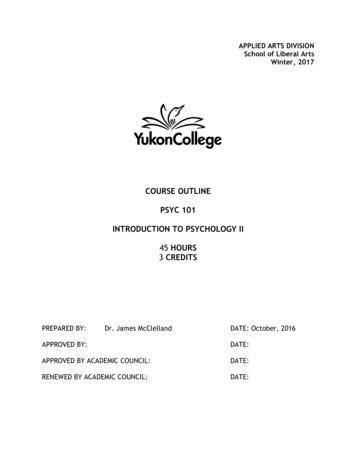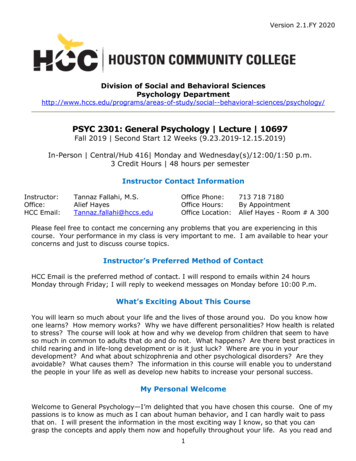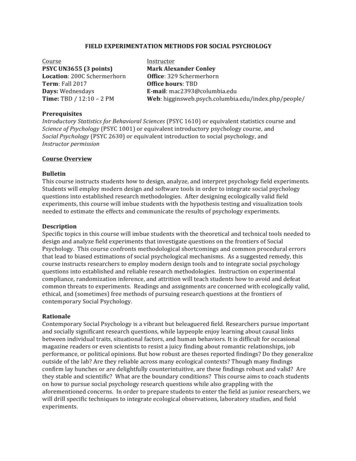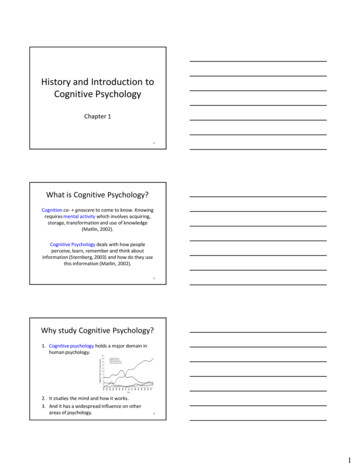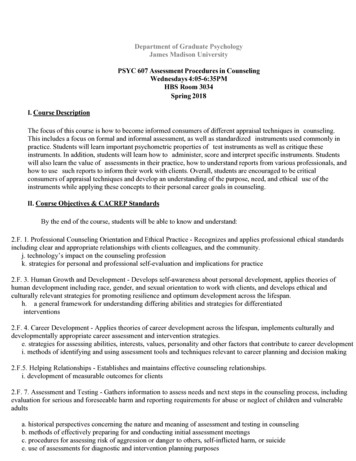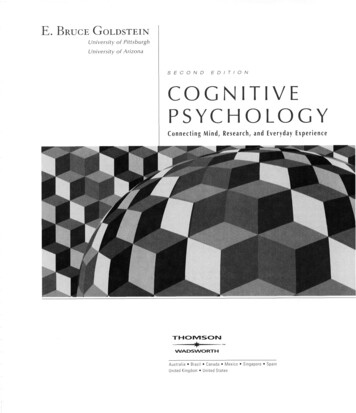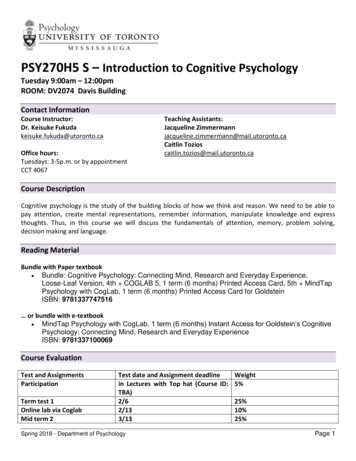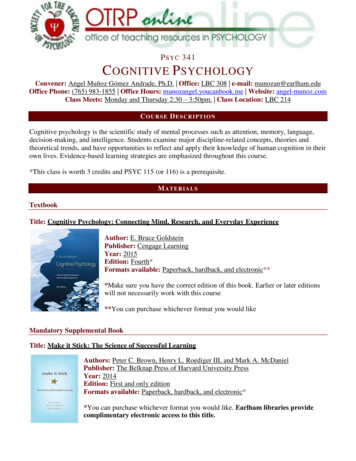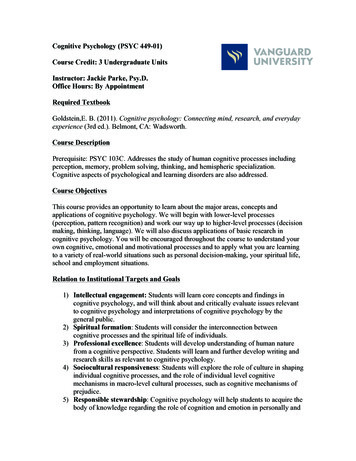
Transcription
Cognitive Psychology (PSYC 449-01)Course Credit: 3 Undergraduate UnitsInstructor: Jackie Parke, Psy.D.Office Hours: By AppointmentRequired TextbookGoldstein,E. B. (2011). Cognitive psychology: Connecting mind, research, and everydayexperience (3rd ed.). Belmont, CA: Wadsworth.Course DescriptionPrerequisite: PSYC 103C. Addresses the study of human cognitive processes includingperception, memory, problem solving, thinking, and hemispheric specialization.Cognitive aspects of psychological and learning disorders are also addressed.Course ObjectivesThis course provides an opportunity to learn about the major areas, concepts andapplications of cognitive psychology. We will begin with lower-level processes(perception, pattern recognition) and work our way up to higher-level processes (decisionmaking, thinking, language). We will also discuss applications of basic research incognitive psychology. You will be encouraged throughout the course to understand yourown cognitive, emotional and motivational processes and to apply what you are learningto a variety of real-world situations such as personal decision-making, your spiritual life,school and employment situations.Relation to Institutional Targets and Goals1) Intellectual engagement: Students will learn core concepts and findings incognitive psychology, and will think about and critically evaluate issues relevantto cognitive psychology and interpretations of cognitive psychology by thegeneral public.2) Spiritual formation: Students will consider the interconnection betweencognitive processes and the spiritual life of individuals.3) Professional excellence: Students will develop understanding of human naturefrom a cognitive perspective. Students will learn and further develop writing andresearch skills as relevant to cognitive psychology.4) Sociocultural responsiveness: Students will explore the role of culture in shapingindividual cognitive processes, and the role of individual level cognitivemechanisms in macro-level cultural processes, such as cognitive mechanisms ofprejudice.5) Responsible stewardship: Cognitive psychology will help students to acquire thebody of knowledge regarding the role of cognition and emotion in personally and
socially relevant decision making, and to exercise the skill of critical thinkinguseful for making decisions regarding personal, family, church, business, andsocietal matters.Student Learning OutcomesBy the end of the course, the student will accomplish important learning outcomes. Thefollowing outcomes are achieved through active engagement in specific class activitiesand assignments:1) Develop and demonstrate critical thinking skills and metacognitive skillsthroughout the class2) Develop and demonstrate oral presentation skills3) Understand and articulate the connection between the physical brain and cognitiveprocesses, or the mind4) Understand and articulate how perception provides building blocks of cognitionand interacts with existing knowledge to form representations in bottom-up andtop-down processes5) Understand and articulate how sensory perceptions may interact with cognition inunusual/unintended ways6) Understand and apply the knowledge of nature and limitations of attention7) Understand the ways in which the human mind represents knowledge8) Understand and apply the knowledge of principles of long-term memory9) Understand, articulate, and be able to apply the principles of working memory10) Understand how brain physiology, experience, and other influences may altercognitive functioning of savants11) Understand and articulate the function of executive processes, metacognition, andtheir connection to brain damage and learning disabilities12) Understand the links between bilingualism, working memory, and executiveprocesses13) Understand how emotion influences cognition, including memory, attention, andmental health14) Understand influences on decision-making and principles of better decisionmaking15) Understand the nature and applications of reasoning and improve logical andreasoning skills16) Apply knowledge of cognitive psychology to everyday life and improvemetacognition skills17) Learn to think about and critically evaluate issues relevant to cognitivepsychology and interpretations of cognitive psychology by the general publicRelation of Course to Psychology Major RequirementsCognitive Psychology represents an important area of the field of psychology and isrequired for psychology majors.PSYC449-01: Cognitive Psychology – Syllabus Page 2 of 9
Course ContentMain topics of this course correspond to the chapters from the text. Each of thesechapters provides a general overview of a specific area of cognitive psychology.Additional readings and assignments will be used to help you integrate material learnedfrom the text and to see a “big picture” of cognitive psychology as both scientificdiscipline and applied field, as well as the use of cognitive psychology by general public.Online ComponentsThis class will utilize Vanguard University’s online courseware—Moodle. Each studentwill be required to set up an account. Throughout the course of the semester, I will utilizethe course site to post notes, activities and a variety of material. Additionally, you will beable to track your grades and course progress. Please set up an account and log in atlearn.vanguard.edu.This class also utilizes CogLab, an online learning component developed by the publisherof the textbook (Wadsworth/Cengage). Each student will be required to access CogLabwith the access code included with their textbook. Note that this class will utilize CogLabversion 5, available at https://coglab.cengage.com/Course Requirements and Assignments1. Both attendance and participation are important to your learning in general as wellas to this class in particular. Both count toward your final grade in this course aswell.2. There will be fourteen online CogLabs required for this course. CogLab is anonline learning component created by the publisher of the textbook that helps toenliven the textbook content and illustrates how empirical research gives rise tonew advances in cognitive psychology. Therefore, students will need a newversion of the textbook that includes an online access code for CogLab. Studentswill be required to complete the fourteen CogLabs online and submit their data tothe class “group” data. The link for each CogLab will be posted on Moodle. Thedeadline for completing each CogLab is 2:30pm on the due date (see syllabus fordue dates). The link for accessing CogLab version 5 is https://coglab.cengage.com3. There will also be fourteen online quizzes posted on Moodle that students arerequired to complete for this course. The quizzes will cover content relevant tothat day’s CogLab as well as reading from the textbook. It is expected thatstudents complete the online quizzes independently, without help from theirclassmates, as a matter of academic integrity and honesty. Students mayconsult their textbook or class notes in the process of completing quizzes,however. Each quiz is due by 2:30pm on the due date (see syllabus for due dates).4. There will be four in-class exams administered (see course schedule for dates).Each exam will contain material from the assigned reading as well as relevantlecture, discussion, group projects, and classroom media presentations. Examswill include 50 multiple choice questions (2 points per question) and two extraPSYC449-01: Cognitive Psychology – Syllabus Page 3 of 9
credit questions. It is the responsibility of the student to notify the instructor assoon as practically possible if an exam will be missed. Makeup exams will onlybe granted in the event of extenuating circumstances (e.g., a family emergency,unforeseen illness, etc.).5. Students are also required to write a TED Talk Paper. This assignment entailssearching through the archives of “TED Talks” at http://www.ted.com/talks andfinding a talk that relates to content from this course. The paper should explainhow content learned during this course relates to the content of the TED Talk. Seegrading rubric at the end of this syllabus for details regarding grading andexpectations for the paper.Evaluation ComponentsGraded ComponentPoint ValueAttendance (5 points per day)150Participation8514 CogLabs (10 points each)14014 Quizzes (10 points each)1404 Exams (100 points each)400TED Talk Paper85Total Possible Points 1000NOTE: All assignments must be handed in on time. No late assignments will beaccepted. Assignments must be typed and will not be accepted via email. TheCogLabs and quizzes should be completed online by 2:30pm on their due date; theTED Talk Paper should be uploaded via Moodle by 2:30pm on its due date.Grading Overview and PoliciesYour grade in this class is determined by the total number of points you have at the endof the semester, regardless of the points of other students. There is no “curve” forgrading. You should therefore feel free to help each other learn, study, and succeed inclass (of course, not during your tests or quizzes). Indeed, there is good evidence thatthose who help others learn are actually helped by the helping. Explaining a concept toanother student will often help you to better learn and retain that concept.PSYC449-01: Cognitive Psychology – Syllabus Page 4 of 9
The grading scale is as follows:Letter Grades (Based On % of Total Points)93% - 100% A73% - 76.9% C90% - 92.9% A70% - 72.9% C87% - 89.9% B 67% - 69.9% D 83% - 86.9% B63% - 66.9% D80% - 82.9% B60% - 62.9% D77% - 79.9% C 00% - 59.9% FLetter Grades (Based On Number of Total Points)930 – 1000 A730 – 769 C900 – 929 A700 - 729 C870 – 899 B 670 – 699 D 830 – 869 B630 – 669 D800 – 829 B600 – 629 D770 – 799 C 0 – 599 FAttendanceAttendance and participation are both important aspects of your learning experience ingeneral and this course in particular. There will be a sign-in sheet during each classsession, and it is your responsibility to sign in at the beginning of each class session.If you miss a class, it is your responsibility to still submit assignments by their due date.As previously stated, all assignments are due by 2:30pm on the due date. I will notaccept late assignments.Makeup ExaminationsIt is the responsibility of the student to notify the instructor as soon as practically possibleif an exam will be missed. Makeup exams will only be granted in the event ofextenuating circumstances (e.g., a family emergency, unforeseen illness, etc.). Eachstudent needing to take a make-up exam must schedule an acceptable time with theprofessor. The professor reserves the right to alter the style of the make-up examination.There will be no make-up work on the online CogLabs, quizzes, or TED Talk paper.AccommodationsThe Disability Services Office offers resources and coordinates reasonableaccommodations for students with disabilities. Reasonable accommodations areestablished through an interactive process between you, your professor(s), and theDisability Services Office (DSO). If you have not yet established services through theDSO, but have a temporary or permanent disability that impacts your learning, attention,mental health, vision, hearing, physical health, or other disabilities that may requireaccommodations, you are welcome to contact the DSO, located in the Scott AcademicPSYC449-01: Cognitive Psychology – Syllabus Page 5 of 9
Center, Office 244, 714-619-6483, disabilityservices@vanguard.edu.Students with a documented learning disability who would like to request appropriateaccommodations should contact Barbi Rouse, Director of Learning Skills, ScottAcademic Center second floor, 714-619-6478, barbi.rouse@vanguard.edu.Academic IntegrityStudents who violate university standards of academic integrity are subject to disciplinarysanctions, including failure in the course and suspension from the university. Sincedishonesty in any form harms the individual, other students and the university, policieson academic integrity are strictly enforced. I expect that you will familiarize yourselfwith the academic integrity guidelines found in the current student handbook.IMPORTANT: Work must be ORIGINAL; plagiarism is a very serious offense, willlikely lead to failure of assignment, and may even lead to failure of course or expulsionfrom the university (please see current University Catalog). If students have anyquestions about what is or is not plagiarism, they should be sure to consult instructorBEFORE submitting assignment.Course Schedule of Readings, Assignments, and ActivitiesDateTopicReading and/orAssignments DueMonday, August 26thIntroduction to the CourseNoneWednesday, August 28thIntroduction to CognitivePsychologyChapter 1 (pp. 2 – 21)Monday, September 2ndLabor Day Holiday(No Class)NoneWednesday, September 4thCognitive NeuroscienceChapter 2 (pp. 22 – 36)CogLab and Quiz Due:Brain AsymmetryMonday, September 9thCognitive NeuroscienceChapter 2 (pp. 36 – 45)Wednesday, September 11th PerceptionChapter 3 (pp. 46 – 66)CogLab and Quiz Due:Muller-Lyer IllusionMonday, September 16thChapter 3 (pp. 66 – 79)PerceptionPSYC449-01: Cognitive Psychology – Syllabus Page 6 of 9
Wednesday, September 18th AttentionChapter 4 (pp. 80 – 98)CogLab and Quiz Due:Stroop EffectMonday, September 23rdChapter 4 (pp. 98 - 113)CogLab and Quiz Due:Change DetectionAttentionWednesday, September 25th Exam #1: Chapters 1-4NoneMonday, September 30thShort-term and WorkingMemoryChapter 5 (pp. 114 – pp.130)Wednesday, October 2ndShort-term and WorkingMemoryChapter 5 (pp. 130 – 145)CogLab and Quiz Due:Memory SpanMonday, October 7thLong-term Memory:StructureChapter 6 (pp. 146 - 157)Wednesday, October 9thLong-term Memory:StructureChapter 6 (pp. 157 - 169)CogLab and Quiz Due:Serial PositionMonday, October 14thLong-term Memory:Encoding and RetrievalChapter 7 (pp. 170 - 187)Wednesday, October 16thLong-term Memory:Encoding and RetrievalChapter 7 (pp. 187 - 201)CogLab and Quiz Due:Encoding SpecificityMonday, October 21stExam #2: Chapters 5-7NoneWednesday, October 23rdEveryday Memory andMemory ErrorsChapter 8 (pp. 202 - 222)CogLab and Quiz Due:Memory JudgmentMonday, October 28thEveryday Memory andMemory ErrorsChapter 8 (pp. 222 - 237)Wednesday, October 30thKnowledgeChapter 9 (pp. 238 - 249)CogLab and Quiz Due:Absolute IdentificationPSYC449-01: Cognitive Psychology – Syllabus Page 7 of 9
Monday, November 4thKnowledgeChapter 9 (pp. 250 - 267)Wednesday, November 6thVisual ImageryChapter 10 (pp. 268 - 279)CogLab and Quiz Due:Mental RotationMonday, November 11thVisual ImageryChapter 10 (pp. 279 - 291)CogLab and Quiz Due:Link WordWednesday, November 13thExam #3: Chapters 8-10NoneMonday, November 18thLanguageChapter 11 (pp. 292 - 304)Wednesday, November 20thLanguageChapter 11 (pp. 304 - 323)CogLab and Quiz Due:Lexical DecisionMonday, November 25thProblem SolvingChapter 12 (pp. 324 –339)Wednesday, November 27thThanksgiving Holiday(No Class)NoneMonday, December 2ndProblem SolvingChapter 12 (pp. 340 - 357)TED Talk Paper Due(No CogLab or QuizDue)Wednesday, December 4thReasoning and DecisionMakingChapter 13 (pp. 358 –374)CogLab and Quiz Due:Typical ReasoningMonday, December 9thReasoning and DecisionMakingChapter 13 (pp. 375 - 389)CogLab and Quiz Due:Decision MakingFriday, December 13th(3:30 – 5:30pm)(Final) Exam #4: Chapters11-13NonePSYC449-01: Cognitive Psychology – Syllabus Page 8 of 9
TED Talk Paper Grading RubricFor this assignment, students should search http://www.ted.com/talks and find one “TEDTalk” video that corresponds well to content learned during this course. Write a 10-12page paper that is in APA format and discusses how the video relates to content you havelearned during this course. An example video – not to be used for this assignment – isAris Venetikidis: Making Sense of Maps(http://www.ted.com/talks/aris venetikidis making sense of maps.html). You couldwatch this video about mental maps and then write your paper as a discussion of how theTED talk relates to content learned in Chapter 10 (Visual Imagery).Your paper should provide a brief summary of the TED Talk and then speak to thefollowing questions:1. How does this TED Talk relate to content learned during this course? Be specificin discussing ideas, concepts, and specific research.2. How is the TED Talk consistent with specific content learned during this course?3. Are there ways in which the TED Talk is inconsistent or contradictory withspecific content learned during this course?4. If you could speak with the speaker who gave the TED Talk, what specificknowledge would you share with them about cognitive psychology that couldfurther enhance their talk? This can take the form of either specific, existingknowledge or questions for future exploration in cognitive psychology.The TED Talk paper is due by 2:30pm on December 2nd and should be submittedvia Moodle.APA-format title pageIncludes a brief, 1-page summary of TED TalkSpeaks to the four questions (above)Demonstrates critical thinking andreflection/analysis, not just recitation of informationReferences, including video link referenceVideo link is posted on Moodle by 2:30pm on 12/28 to 10 pages in length of original content (notcounting title page or references)Overall writing style and APA formatting(10 exceptional quality of writing;9-7 well-written and mostly consistent with APAformat; 6-4 contains grammatical errors,unprofessional vocabulary;3-0 writing style is poor enough to detract fromreader’s understanding due to grammatical errors,spelling, formatting, etc.)Points Possible31030Points Earned2513310Total Possible 85PSYC449-01: Cognitive Psychology – Syllabus Page 9 of 9Total Score
Required Textbook Goldstein,E. B. (2011). Cognitive psychology: Connecting mind, research, and everyday experience (3rd ed.). Belmont, CA: Wadsworth. Course Description . Cognitive Psychology represents an important area of the field of psychology and is required for psychology majors. PSYC449-01:
